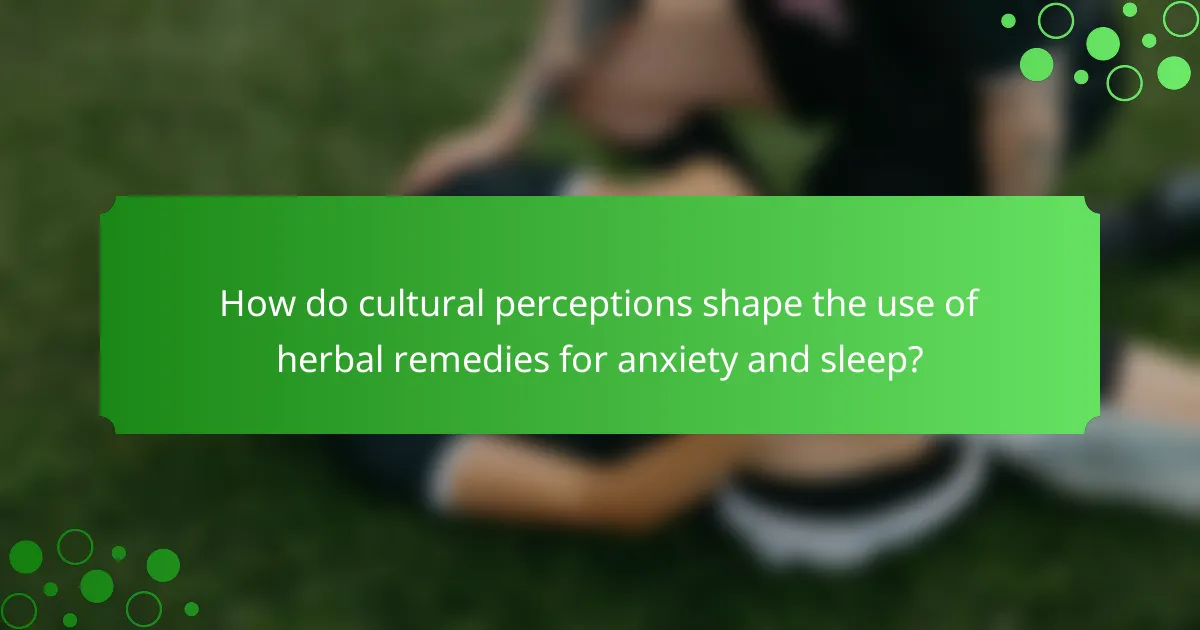Herbal remedies offer a natural approach to relieve anxiety and improve sleep quality. Key options include chamomile, lavender, valerian root, and passionflower, each known for their calming effects. These herbs can help manage stress and promote relaxation, enhancing overall mental wellness. Combining them strategically may amplify their benefits, creating a holistic solution for anxiety and sleep disturbances.

What are the most effective herbal remedies for anxiety relief?
Herbal remedies for anxiety relief include chamomile, lavender, valerian root, and passionflower. These herbs are known for their calming effects and ability to promote relaxation and sleep improvement.
Chamomile, often consumed as tea, contains antioxidants that may reduce anxiety. Lavender, used in aromatherapy, can lower stress levels and improve sleep quality. Valerian root is recognized for its sedative properties, which help alleviate anxiety symptoms. Passionflower is noted for its potential to increase gamma-aminobutyric acid (GABA) levels in the brain, promoting a sense of calm.
Incorporating these herbal remedies into your routine may provide effective anxiety relief and enhance sleep quality. Always consult with a healthcare professional before starting any herbal treatment.
How do herbal remedies compare to conventional treatments for anxiety?
Herbal remedies can provide effective anxiety relief and sleep improvement, often with fewer side effects than conventional treatments. Herbal options like valerian root and chamomile are popular for their calming effects, while medications may lead to dependency or adverse reactions.
Herbal remedies typically focus on natural ingredients, offering benefits such as reduced anxiety symptoms and improved sleep quality. In contrast, conventional treatments often rely on synthetic drugs, which can have a range of side effects and withdrawal issues.
Research indicates that herbal remedies may take longer to show effects but can lead to more sustainable outcomes. For example, valerian root has been shown to improve sleep latency and quality without the grogginess associated with some prescription sleep aids.
Overall, while both approaches have their merits, herbal remedies may appeal to those seeking a more natural and holistic method for managing anxiety and enhancing sleep.
Which herbs are commonly used for anxiety relief?
Herbs commonly used for anxiety relief include chamomile, lavender, valerian root, passionflower, and ashwagandha. These herbs are known for their calming properties and ability to reduce stress. Chamomile is often consumed as tea and can promote better sleep. Lavender is frequently used in aromatherapy for relaxation. Valerian root is known for its sedative effects, while passionflower may help with insomnia and anxiety. Ashwagandha is recognized for its adaptogenic properties, supporting the body in managing stress.
What scientific evidence supports the use of herbal remedies for anxiety?
Scientific evidence supports the use of herbal remedies for anxiety through various studies demonstrating their efficacy. For instance, valerian root and chamomile show significant reductions in anxiety symptoms. A meta-analysis revealed that passionflower is as effective as standard medications for anxiety relief. Additionally, ashwagandha has been linked to lower cortisol levels, contributing to reduced stress. These findings highlight the potential of herbal remedies as viable alternatives for anxiety management.
How do individual responses to herbal remedies vary?
Individual responses to herbal remedies for anxiety relief and sleep improvement vary due to factors like genetics, dosage, and personal health history. Genetic variations can influence how individuals metabolize herbal compounds, affecting efficacy and side effects. Additionally, the dosage and form of intake, such as teas or capsules, can lead to different outcomes. Personal health conditions, such as existing anxiety disorders or sleep issues, also play a significant role in determining how well a remedy works for someone. These unique attributes highlight the need for personalized approaches when considering herbal remedies.

What are the key herbal options for improving sleep quality?
Herbal remedies can significantly improve sleep quality. Key options include chamomile, valerian root, lavender, passionflower, and lemon balm.
Chamomile is known for its calming effects and can reduce anxiety, promoting better sleep. Valerian root has sedative properties, often used for insomnia. Lavender is popular for its soothing aroma, which enhances relaxation. Passionflower may help increase levels of gamma-aminobutyric acid, a neurotransmitter that promotes sleep. Lemon balm is noted for its ability to reduce anxiety and improve sleep quality.
These herbal options offer natural alternatives for those seeking to enhance their sleep without pharmaceuticals.
How do herbal sleep aids work in the body?
Herbal sleep aids work by interacting with neurotransmitters and hormones to promote relaxation and improve sleep quality. They often contain compounds that mimic the effects of GABA, a neurotransmitter that calms the nervous system. For example, valerian root and chamomile are popular herbal remedies known for their sedative properties. These herbs can help reduce anxiety and enhance sleep onset, leading to a more restful night.
Which herbs are known for their sedative properties?
Herbs known for their sedative properties include chamomile, valerian root, lavender, passionflower, and lemon balm. These herbs help promote relaxation and improve sleep quality.
Chamomile is often consumed as tea, known for its calming effects. Valerian root is commonly taken in supplement form and is recognized for its ability to reduce anxiety. Lavender, used in aromatherapy, can enhance sleep through its soothing aroma. Passionflower is another herbal remedy that can alleviate insomnia and anxiety symptoms. Lemon balm, often used in teas, has been shown to reduce stress and promote calmness.
These herbs can be effective natural alternatives for those seeking anxiety relief and improved sleep.
What is the role of dosage in the effectiveness of herbal sleep remedies?
Dosage significantly impacts the effectiveness of herbal sleep remedies. Proper dosage ensures optimal therapeutic effects while minimizing potential side effects. For instance, valerian root is commonly used for sleep improvement, with effective doses ranging from 300 to 600 mg taken before bedtime. Conversely, excessive doses can lead to adverse reactions, such as headaches or digestive issues. Individual responses to herbal remedies vary, making personalized dosage crucial for efficacy. Understanding the balance between dosage and effectiveness can enhance the therapeutic benefits of these natural sleep aids.

How can combining herbal remedies enhance overall mental wellness?
Combining herbal remedies can significantly enhance overall mental wellness by addressing anxiety and improving sleep quality. Herbal remedies like chamomile and valerian root are known for their calming effects, which can reduce stress and promote relaxation.
Incorporating adaptogenic herbs such as ashwagandha can help the body manage stress more effectively, leading to improved mental clarity and emotional resilience. Research indicates that these herbs can lower cortisol levels, contributing to a sense of balance.
Moreover, using a combination of these remedies can create a synergistic effect, amplifying their individual benefits. For instance, pairing passionflower with magnesium can enhance sleep quality, making it easier to fall asleep and stay asleep.
Overall, the strategic combination of herbal remedies offers a holistic approach to mental wellness, targeting both anxiety and sleep disturbances effectively.
What are the potential benefits of using multiple herbs together?
Using multiple herbs together can enhance their individual effects, leading to greater anxiety relief and improved sleep quality. Combining herbs like chamomile, valerian root, and lavender may create a synergistic effect, amplifying their calming properties. Research indicates that such combinations can provide a more holistic approach to managing stress and promoting relaxation. Additionally, blending herbs may reduce potential side effects by allowing lower doses of each herb while maintaining efficacy.
How do lifestyle factors influence the effectiveness of herbal treatments?
Lifestyle factors significantly influence the effectiveness of herbal treatments for anxiety relief and sleep improvement. Factors such as diet, exercise, and stress management play crucial roles. A balanced diet rich in nutrients enhances the absorption and efficacy of herbal remedies. Regular exercise promotes overall well-being, which can amplify the calming effects of herbs. Additionally, effective stress management techniques can optimize the benefits of herbal treatments by reducing overall anxiety levels.

What are the common side effects and risks associated with herbal remedies?
Common side effects of herbal remedies for anxiety relief and sleep improvement include nausea, dizziness, and allergic reactions. Risks may involve interactions with medications and potential for dependence. Monitoring is essential to mitigate these effects.
How can individuals minimize adverse effects when using herbal remedies?
Individuals can minimize adverse effects when using herbal remedies by following specific guidelines. Start with a consultation with a healthcare provider to ensure safety and appropriateness. Use high-quality, reputable sources for herbal products, as purity and concentration can vary significantly.
Begin with lower doses to assess tolerance, gradually increasing only if necessary. Monitor for any side effects, such as gastrointestinal discomfort or allergic reactions, and discontinue use if they occur.
Consider potential interactions with other medications or conditions, as some herbs can amplify or diminish effects. Keeping a journal of symptoms and reactions can help track any changes.
Stay informed about the specific herbal remedies being used, focusing on their root, unique, and rare attributes to understand their effects better.
What interactions should be considered when combining herbs with medications?
Combining herbs with medications can lead to significant interactions. It is crucial to consult a healthcare professional before mixing herbal remedies for anxiety relief and sleep improvement with prescribed medications.
Certain herbs, like valerian and St. John’s Wort, can potentiate or inhibit the effects of medications. For example, St. John’s Wort may reduce the effectiveness of antidepressants and birth control pills. Valerian can enhance sedative effects, leading to excessive drowsiness when combined with other sleep aids.
Monitor for side effects and adjust dosages under medical supervision. Understanding these interactions ensures safe and effective use of herbal remedies alongside conventional treatments.

How do cultural perceptions shape the use of herbal remedies for anxiety and sleep?
Cultural perceptions significantly influence the use of herbal remedies for anxiety and sleep. In many cultures, herbal remedies are viewed as natural alternatives to pharmaceuticals, promoting a holistic approach to mental health.
Traditional practices often emphasize the benefits of specific herbs, such as chamomile and valerian root, which are believed to enhance relaxation and improve sleep quality. These remedies are frequently passed down through generations, reinforcing their cultural significance.
Moreover, the stigma surrounding mental health issues in some cultures can lead individuals to seek herbal solutions as more acceptable treatment options. This cultural context shapes preferences and trust in herbal remedies, impacting their usage rates.
Finally, regional availability of certain herbs can create unique local practices, further diversifying the approaches to managing anxiety and sleep disturbances through herbal means.
Which regions have a rich tradition of using herbal remedies for mental health?
Regions with rich traditions of using herbal remedies for mental health include Asia, Europe, and South America.
In Asia, countries like India and China have long histories of utilizing herbs like ashwagandha and ginseng for anxiety relief and sleep improvement. Europe boasts herbal practices rooted in traditional medicine, with chamomile and valerian being popular choices. South America features indigenous cultures that employ herbs such as passionflower and kava for mental wellness.
These regions highlight the global appreciation for herbal remedies in addressing mental health challenges.
How do local practices influence the choice of herbs for anxiety and sleep?
Local practices significantly influence the selection of herbs for anxiety and sleep. Cultural beliefs, accessibility, and traditional knowledge shape preferences for specific herbs. For instance, chamomile is favored in Western cultures, while ashwagandha is popular in Ayurvedic traditions. Local climate and geography also determine which herbs are readily available, impacting their use in remedies. Additionally, community practices and historical effectiveness contribute to the continued use of certain herbs over others.

What are the best practices for selecting high-quality herbal products?
To select high-quality herbal products for anxiety relief and sleep improvement, prioritize trusted brands known for transparency. Look for third-party testing to ensure potency and purity. Check for organic certification to avoid harmful pesticides. Review ingredient sourcing and extraction methods for quality assurance. Lastly, consult user reviews to gauge effectiveness and safety.
How can consumers identify reputable sources for herbal remedies?
Consumers can identify reputable sources for herbal remedies by researching product transparency, certifications, and customer reviews. Look for companies that provide detailed information about sourcing and manufacturing practices. Certifications from recognized organizations indicate quality and safety standards. Additionally, reading customer feedback can reveal experiences with efficacy and side effects. Engaging with healthcare professionals can also guide consumers toward trustworthy brands.
What certifications or labels should be looked for in herbal products?
Look for certifications such as USDA Organic, Non-GMO Project Verified, and GMP (Good Manufacturing Practices) in herbal products. These labels ensure quality and safety, critical for herbal remedies aimed at anxiety relief and sleep improvement. Additionally, third-party testing certifications can confirm potency and purity, enhancing trust in the product’s effectiveness.
What common mistakes should be avoided when using herbal remedies?
Common mistakes to avoid when using herbal remedies include incorrect dosages, neglecting potential side effects, and mixing incompatible herbs. Additionally, relying solely on herbal remedies without professional guidance can lead to ineffective treatment. Always consult a healthcare professional before starting any herbal regimen.